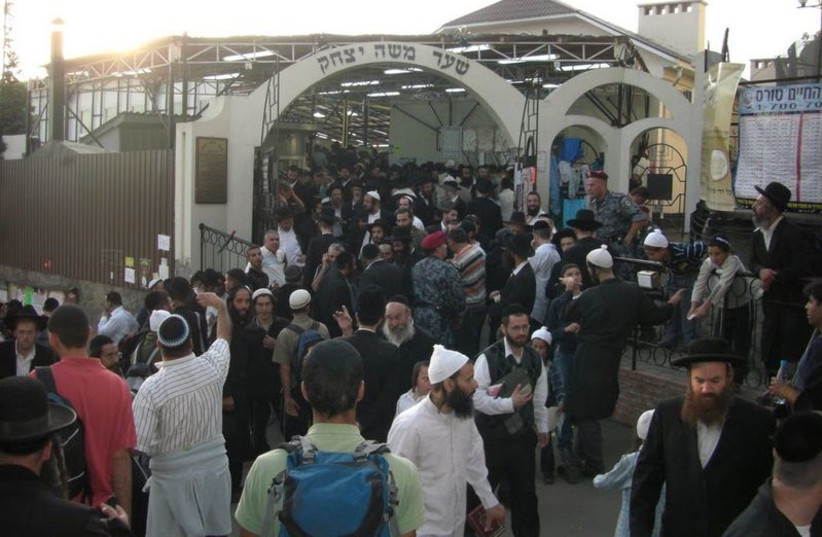It’s an hour before departure for the train to Ukraine but the line of passengers stretches more than 100 meters, intimidating anyone unfamiliar with travel into the war-torn country.
A group of Israeli boys, teenagers with fitted, khaki pants, Blundstone boots, and peyot (sidelocks), readjust their backpacks on their shoulders nervously, scanning the line for any indication that they won’t be shut out of taking a trip to Uman for Rosh Hashanah.
They begin approaching a group of hassidic men, women, and children who are near the front of the line, but a Ukrainian man starts yelling at them, gesturing at the line and pointing to the back.
It’s hard not to be tense, or unsure, while preparing to travel into a country at war. But this is not a deterrent for religious Jews, and Israelis in particular, who are intent on making the pilgrimage to Uman.
Ukraine President Volodymyr Zelensky, in a phone call to Prime Minister Benjamin Netanyahu on Sunday, warned that the city of Uman does not have enough bomb shelters for local residents, let alone an estimated 50,000 pilgrims expected to come for the holiday.

“This is a security challenge that requires an urgent joint response,” Zelensky said, according to a readout of the call from his office.
Netanyahu, in a statement, called for Israelis traveling to Uman “to act responsibly” and that “The Holy One has not always protected us, both on Ukrainian and other European soil.”
Israel’s Foreign Ministry has called for citizens to avoid traveling to Uman because of Russia’s ongoing war in Ukraine.
A dangerous pilgrimage during war
Uman is located on the north-south road between Kyiv and Odesa, two cities that are priority targets for Russian forces looking to attack the Ukrainian government and destroy port and grain infrastructure, which makes up the lifeblood of Ukraine’s economy.
To help smooth the passage of tens of thousands of Israelis to Uman, the Israeli government approved NIS 4 million on Sunday to place Hebrew-speaking and local representatives at the borders and in the city to help manage the area and the crowds. The funds are also expected to help coordinate with countries bordering Ukraine that will receive the influx of Jews and Israelis.
I traveled into Ukraine on September 7, taking the train from the small Polish city of Przemysl, which has become one of two major hubs of crossings for Ukrainians going back and forth across the border.
While I saw no evidence of extra resources to handle the increase in travelers, once the passport checks started, it felt like the whole process ran smoothly.
The train was set to depart at 9:45 a.m., but all ticketed passengers lined up were required to go through passport control, creating a snaking line on an outdoor footpath, leading to a yellow building where the Polish border officers sit in their booths.
I had forgotten that Rosh Hashanah was coming up and the sight of Orthodox families – and hearing them speak Hebrew in the queue – triggered an immediate understanding.
The line of people inched forward in an orderly manner. Despite the mid-morning hour, the late-summer sun was already high in the sky, beating down on the travelers standing outside and far away from the one section of covered path.
It was my first time taking the train across the border into Ukraine. On a reporting trip in August 2022, I flew into Moldova and hired a woman to drive me across the border. I fell asleep in the car over the course of the three-hour wait at passport control between Moldova and Ukraine, feeling secure with my driver that we would reach our destination of Odesa eventually.
But I’m alone for the train ride and there seems to be no one who speaks English that can answer my questions about the process. The woman next to me understands me, but has trouble answering, nodding her head when I point to my bag and then point to the front of the line, miming that I’m going to get more information.
There’s a shipping container converted as an office, with Wi-Fi, hot water, instant coffee, tea, and hot chocolate, courtesy of the National House in Przemysl and the Association of Ukrainians in Poland. There’s a young girl behind a desk engrossed in her phone, but when I ask for help, she assures me that the line will start moving shortly.
I walk back to my place in line and the young woman who was watching my bag starts to say in English that she can understand everything I say, but has trouble remembering vocabulary because she’s so focused on studying Polish.
I don’t get her name, but the woman eventually tells me about her decision to leave Kyiv with her son at the beginning of Russia’s full-scale invasion in February 2022. She is one of the few lucky ones who managed to have her husband exit the country, as the declaration of martial law in Ukraine has since prevented men of fighting age from leaving the country.
Her parents are still in Kyiv, and she tries to go back every two or three months to spend a week in the country. She says she gets depressed when she’s away for too long and the trip revives her.
“I don’t want to live in another country,” she told me.
An English speaker is a novelty and it provides a distraction for the majority of women waiting in the line. Another woman, Katerina, who goes by “Kate,” steps forward as having the best English language skills. She’s wearing a jean baseball cap with an American flag outlined in rhinestones. She reassures me, again, that the line will move eventually and says for good measure that the train is easier and more comfortable than the bus.
